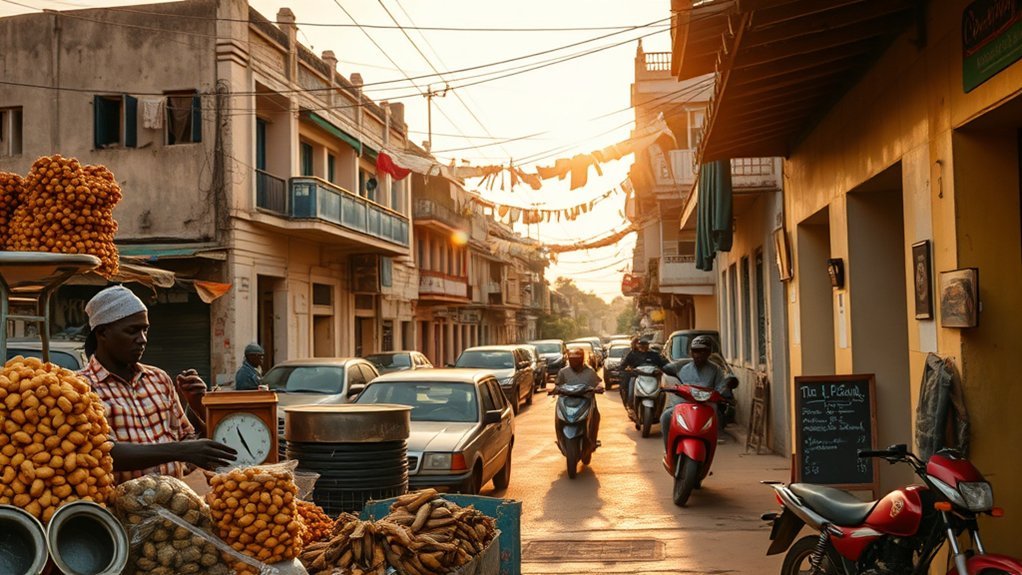You’ll need roughly $900–$1,100 per month to cover typical living costs in Guinea-Bissau, though your budget will vary by city and lifestyle. Rent ranges from about $255 outside city centers to $443 for a one‑bed downtown, utilities average $66, and internet is around $44. Public transport is cheap but private healthcare and schooling can add big expenses. Plan for sporadic power and limited supply in urban rentals — keep reading to get practical tips and detailed line items.
Overview of Living Costs and Economic Context in Guinea-Bissau
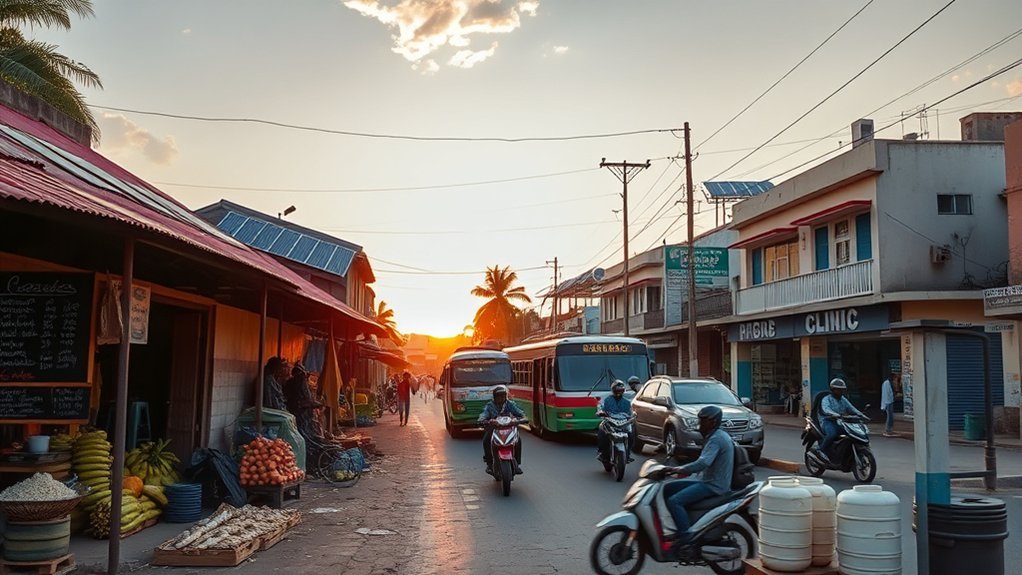
Although Guinea-Bissau is cheaper than many countries, you’ll still want a tight budget: the average cost of living is about $902 (ranked 109/197), with city-center one-bedroom rent near $443 and $255 outside the center.
That Cost of Living Index shows you’ll face lower prices overall, but local wages are modest—the average monthly salary after tax is $1,051—so earnings cover roughly 1.2 months of reported expenses.
For budgeting, account for predictable recurring costs: utilities average $65.7 per person and basic internet (50 Mbps+) runs about $44.1.
Food and transport are affordable—a restaurant meal for two costs roughly $26.7 and public transit fares hover near $0.54—so you can control discretionary spending.
Given the gap between income and typical costs, prioritize essentials, build a small contingency fund, and track monthly outflows against the Cost of Living Index benchmarks to avoid shortfalls while living in Guinea-Bissau.
Housing and Rental Market: Prices and Availability
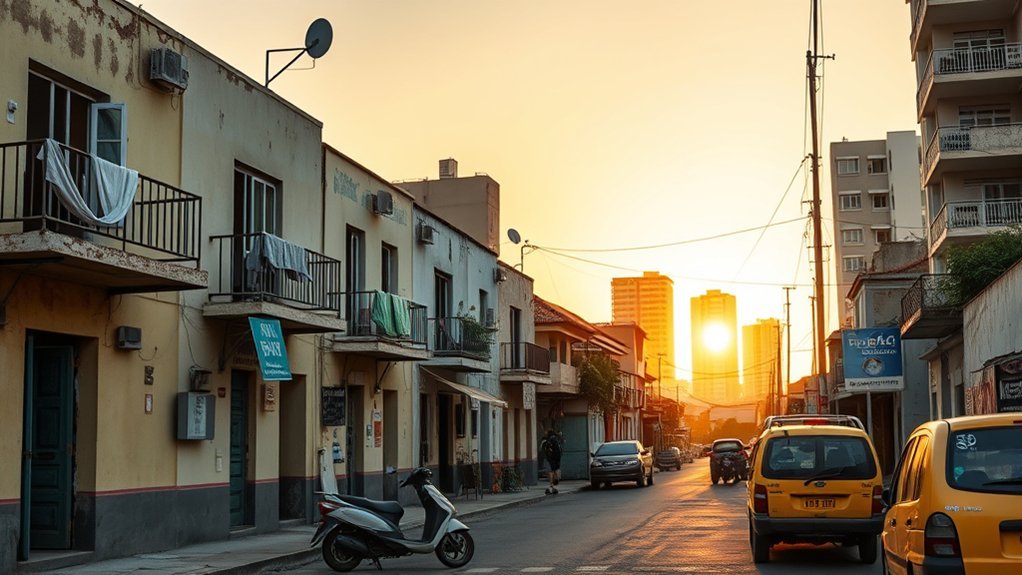
Because housing eats a large share of budgets in Bissau, you’ll want to plan carefully: city-center one-bedrooms average $443/month while outside the center they drop to about $255. Three-bedroom units in the center run near $714, and per-square-meter prices sit around CFA228,452 (≈$374).
Housing costs in Bissau are high—expect ~$443/month for central one-bedrooms versus ~$255 outside the center.
You’ll find limited supply and high purchase prices: a new house averages CFA10.23M (≈$16,763) and a 100m² house about CFA19.5M (≈$31,953). Only 5.77% of urban households could afford the cheapest new house in 2021, so buying is out of reach for most.
If you consider buying, calculate loan scenarios with prevailing Interest Rate assumptions and read mortgage Terms of Use carefully—fees and eligibility can erode affordability.
For renting, prioritize location vs. space: moving outside the center cuts costs considerably. Use these figures to set a realistic housing budget, factor in upfront deposits and potential renovation costs, and expect limited formal market options and competitive demand.
Utilities, Internet, and Household Expenses
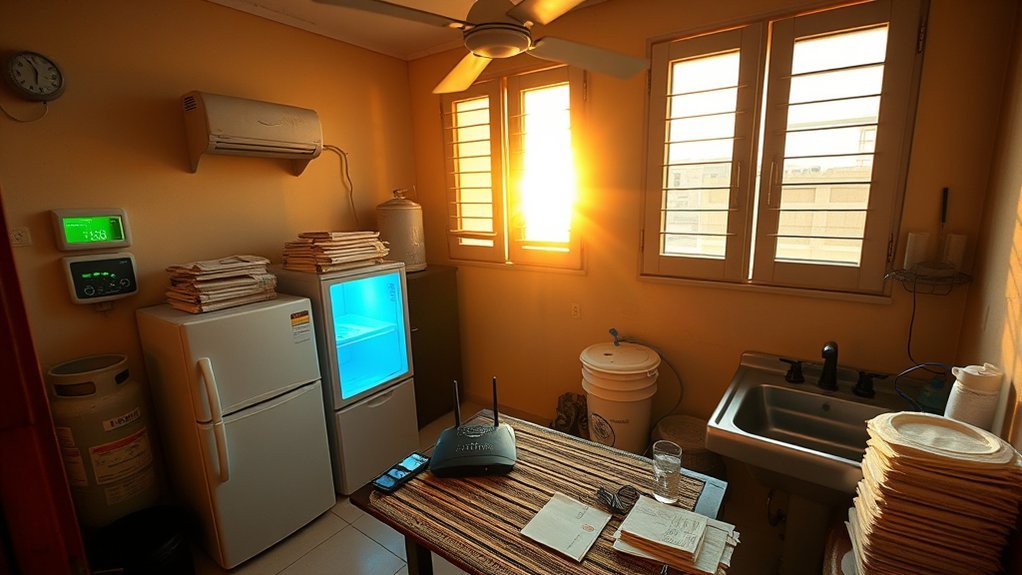
When you budget for living in Guinea-Bissau, plan on roughly $65.70/month for basic utilities per person and about $44.10 for a 50+ Mbps internet plan, with rent still the dominant expense (one‑bed city‑center ≈ $443, outside ≈ $255; three‑bed center ≈ $714). You’ll prioritize utility management to avoid spikes from unreliable power and cooling. Compare internet providers for uptime and bundle discounts; $44.10 is a baseline for stable household connectivity. Factor utilities and internet into household budgeting as fixed monthly lines that compound with rent.
| Item | Typical Monthly Cost | Notes |
|---|---|---|
| Utilities (per person) | $65.70 | Electricity, water, basic services |
| Internet (50+ Mbps) | $44.10 | Compare providers for reliability |
| One‑bed rent (center) | $443 | Major expense driver |
| One‑bed rent (outside) | $255 | Lower rent, higher transport risk |
Use this table to model scenarios and keep contingency funds for outages and equipment.
Food, Groceries, and Dining Out Costs
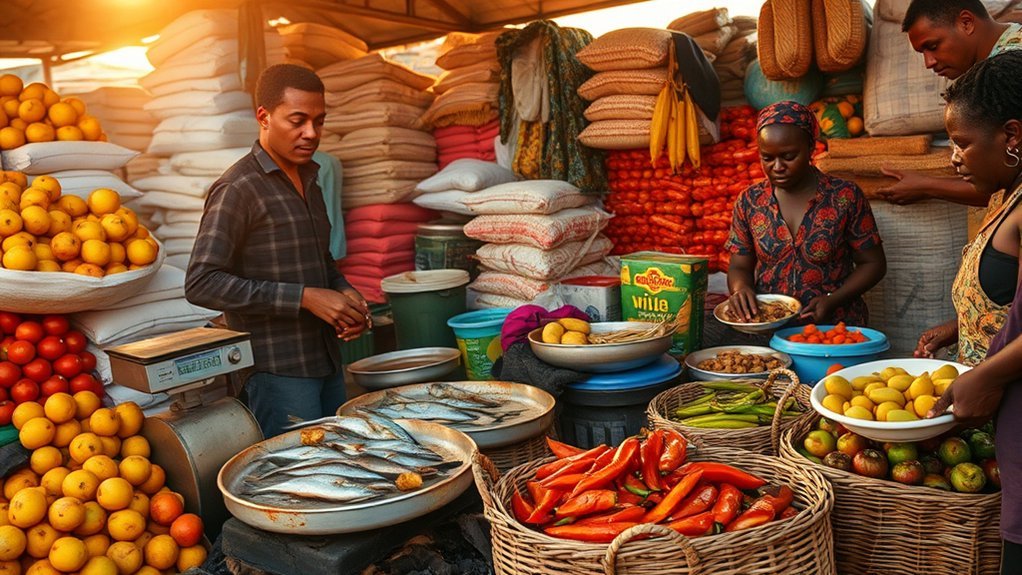
You’ll want to compare grocery item prices — they vary widely by product and source — to build a realistic weekly budget.
Expect typical meal costs around $6.63 for lunch and about $26.70 for a dinner for two, with affordable transport options (local ticket $0.54, 8 km taxi ~$6.19) when planning where and how often you eat out.
Use those figures to set a practical eating-out frequency that fits your overall cost-of-living plan.
Grocery Price Breakdown
How much will your weekly food bill look like in Guinea-Bissau? You’ll find basic groceries generally affordable, but prices swing with seasonality and availability.
Use grocery shopping tips: prioritize seasonal produce from local markets, buy staples in bulk, and plan meals around what’s cheapest that week. Local transport (~$0.54) keeps markets accessible, so compare market and store prices.
Dining out remains a cost-effective backup if fresh ingredients are scarce, given low average restaurant costs.
- Relief when you find cheap seasonal produce that stretches your budget
- Frustration during off-season price spikes
- Satisfaction buying staples in bulk to stabilize costs
- Confidence maneuvering local markets for better deals
- Ease using transport to reach multiple vendors
Typical Meal Costs
Shifting from grocery strategies to actual meal spending, expect a typical lunch to run about $6.63 per person and a dinner for two at a mid-range restaurant to average roughly $26.70; those figures let you model daily food costs quickly.
You’ll balance grocery price variability with meal variety options—local markets offer cheaper staples, imported goods raise your bill, and monthly groceries fluctuate with diet and season.
Factor in $0.54 local transport tickets when planning trips to markets or restaurants.
For practical budgeting, set weekly and monthly food limits, track itemized grocery receipts, and prioritize staple purchases.
Be aware of dining etiquette tips and cultural cuisine influences when choosing meals; they shape portion sizes, costs, and where you’ll want to spend.
Eating Out Frequency
Curious how often you should eat out in Guinea-Bissau given local prices? You’ll find eating habits tilt toward dining out: a lunch menu is about $6.63 and a dinner for two averages $26.70, making restaurants competitively priced versus variable grocery costs.
Use transport costs—$0.54 bus, $6.19 for an 8 km taxi—to decide frequency. If your monthly grocery bill spikes with imported items, you’ll likely eat out more to control costs.
Balance meal variety and budget by mixing local eateries with occasional restaurant meals; that fits local restaurant culture and keeps overall living expenses below the world average.
- Relish simple, affordable lunches.
- Savor diverse dinner options.
- Save by avoiding costly groceries.
- Embrace local restaurant culture.
- Stretch your food budget with meal variety.
Transportation and Local Mobility Expenses
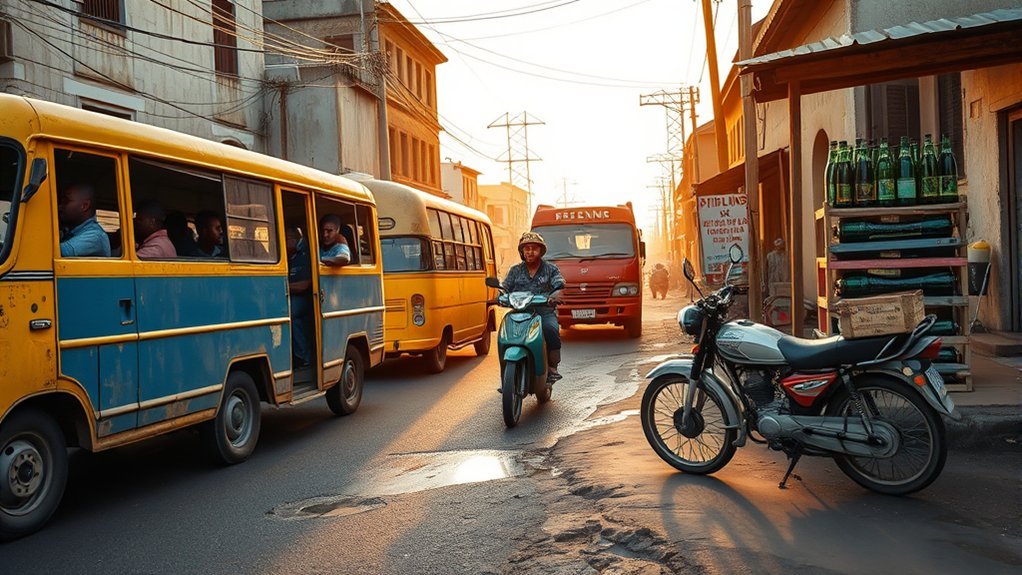
While public transport fares are cheap—about $0.54 per ticket—you’ll often pay more if you rely on taxis (an 8 km ride averages $6.19) or own a vehicle.
So monthly transport costs depend heavily on whether you mostly use buses, taxis, or a private car. You’ll find public transport options concentrated in urban centers, making daily commuting inexpensive if you stick to buses or shared rides.
Taxi services are affordable for short trips or when schedules don’t match, but regular use quickly raises your monthly bill compared with bus fares.
Taxis work well for quick, off-schedule trips, but frequent use can quickly inflate your monthly transport costs.
In rural mobility scenarios, services are sparse, so you’ll likely need taxis or a car, which increases fuel and maintenance expenses.
To budget, track trip frequency and distances: multiply $0.54 for bus trips or $6.19 per typical taxi run, then add occasional fuel and upkeep if you own a vehicle.
Average Salaries, Employment, and Affordability
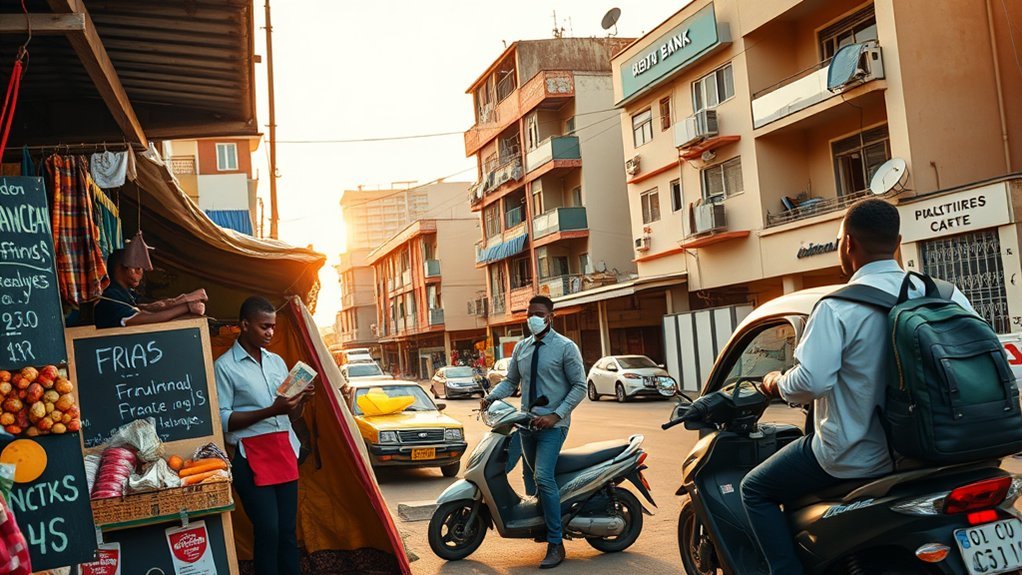
Costs for getting around feed directly into how far your paycheck stretches, so let’s look at salaries and affordability next. The average after-tax salary is about $1,051 monthly, while basic living costs run $902, so your pay covers roughly 1.2 months of expenses.
Salary trends show modest real purchasing power because housing eats a big share: a one-bedroom city apartment is ~$443, three-bedroom ~$714. Employment opportunities are concentrated in agriculture (75–80% of workers), limiting formal sector wage growth and amplifying economic challenges for urban job-seekers.
The Gini coefficient of 33.4 and ~60.4% poverty rate underline uneven income distribution.
- You may feel squeezed by housing costs despite lower overall prices.
- You might rely on informal work tied to agriculture.
- You’ll notice limited high-wage jobs in cities.
- You’ll need tight budgeting to manage rent and essentials.
- You’ll confront structural economic challenges affecting upward mobility.
Access to Services, Healthcare, and Education Costs
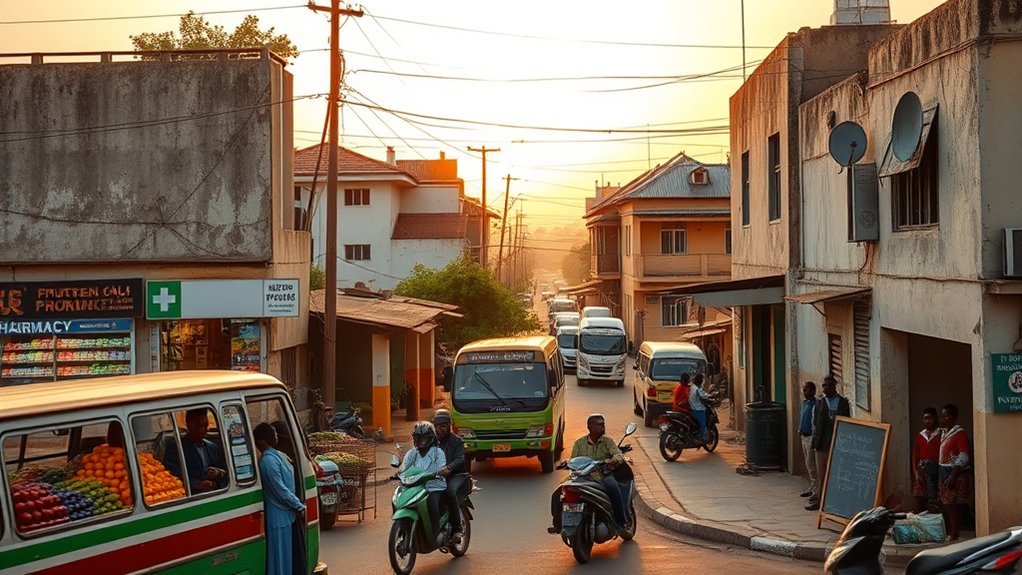
You’ll find public healthcare coverage is patchy—formal facilities are scarce, so many rely on informal providers and face unpredictable out-of-pocket costs.
Private clinics offer more reliable care but charge fees that often exceed local monthly incomes, so budget for emergencies or insurance where possible.
Schooling costs are another pressure: tuition and related fees limit secondary completion, so factor education expenses into household financial planning.
Public Healthcare Access
Because basic services are limited, accessing public healthcare in Guinea-Bissau often means maneuvering through gaps in water, power, and funding that directly affect treatment quality and cost.
You’ll face healthcare disparities that shape patient experiences: urban water access is 80.3% and electricity 50%, undermining infection control and equipment use.
With 60.4% poverty and average net monthly pay $1,051 covering about 1.2 months of living, you’ll likely delay care or seek informal options.
Government initiatives aim to expand infrastructure, but limited public investment and tight household budgets keep services inadequate.
Budget realistically: prioritize preventive care, keep emergency savings, and track out-of-pocket risks when public clinics can’t meet needs.
- Fear of unaffordable care
- Frustration with inconsistent services
- Anxiety over power-dependent treatments
- Resignation to delayed care
- Hope tied to slow reforms
Private Clinic Expenses
Given the gaps in public care, many people turn to private clinics and should budget accordingly: general consultations run about $10–$30, routine check-ups average $25, and emergency visits can exceed $50.
You’ll find private clinic prices vary by provider and location; add $15–$50 for common lab tests or basic imaging. Against an average monthly salary of about $1,051, even routine care can be a significant expense, so plan monthly or emergency funds.
Consider subscription or package options some clinics offer to lower per-visit costs. Note healthcare accessibility is remarkably better in cities: urban rural disparities mean you may face travel costs and limited options in rural areas.
Factor all this into your local budget planning.
Schooling and Tuition
While primary enrollment sits around 64% and secondary rates are lower, access to quality schooling in Guinea-Bissau remains constrained.
So you should budget beyond basic tuition for uniforms, books and supplies that often push costs up—public tuition is low but these extras hit rural families hardest.
Expect private schools to cost $200–$600 annually; higher education faces underfunding and limited programs, so plan contingencies.
Consider seeking tuition assistance, local literacy programs, or NGO support to offset gaps.
Track expenses monthly, prioritize essential supplies, and evaluate school quality versus cost before enrolling.
Educational challenges mean you may need alternative arrangements or supplemental tutoring to reach literacy benchmarks and improve future opportunities.
- Heartbreak when a child misses books
- Pride in small learning gains
- Frustration with scarce resources
- Hope from literacy programs
- Relief with tuition assistance
Tips for Expats and Ways to Reduce Living Expenses
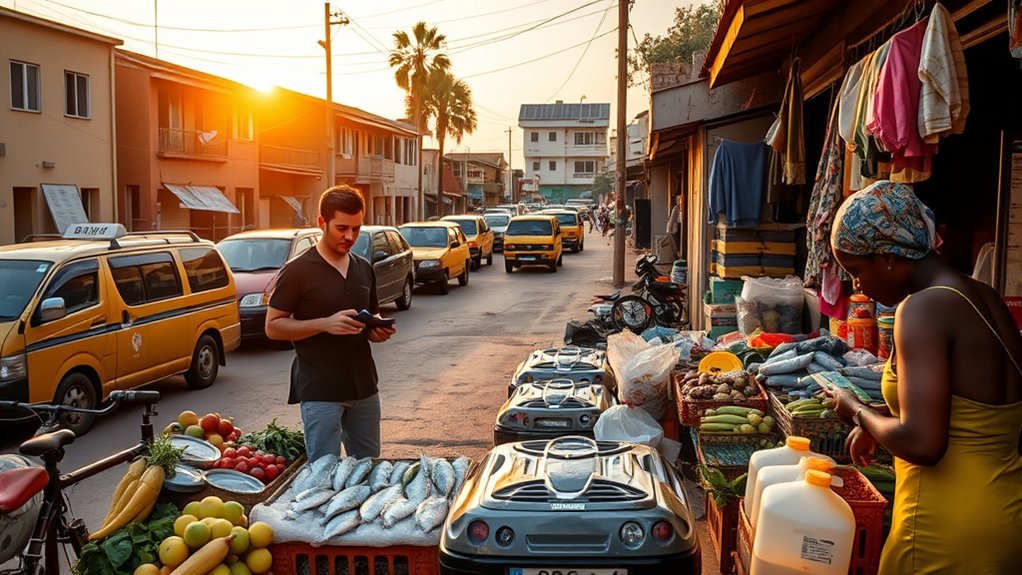
If you prioritize local options and track basic monthly costs, you can live in Guinea-Bissau affordably: city-center one-bed apartments run about $443 (cheaper units near $255), utilities average $65.70 per person, a lunch menu is ~$6.63 and dinner for two ~$26.70, local transport fares are $0.54 per trip and an 8 km taxi about $6.19—so choosing market groceries, using buses/taxis selectively, and targeting lower-rent neighborhoods will cut your monthly outlay quickly. Use local markets for groceries, learn local customs to avoid price markups, and join expat communities for housing leads and shared transport. Cook more lunches, dine out selectively, and monitor utility usage to keep bills near the $65.70 average. Prioritize location over size to save on rent and use buses for routine trips. Network for secondhand furniture and bulk-buy staples. Below is a quick cost checklist.
| Item | Typical Cost | Savings Tip |
|---|---|---|
| Rent (city) | $443 | Lower-rent neighborhoods |
| Utilities | $65.70 | Conserve energy |
| Lunch | $6.63 | Cook at home |
| Taxi (8 km) | $6.19 | Share rides |
| Groceries | varies | Buy local markets |
Frequently Asked Questions
How Much Is Rent in Guinea-Bissau?
Rent in Guinea-Bissau ranges roughly $255–$443 for one‑bedrooms, about $714 for a three‑bedroom in city center; rental prices vary by housing options, so factor these into living expenses for practical, data‑driven budgeting.
Is Guinea-Bissau a Good Place to Live?
Not really — you’d face serious safety concerns, limited healthcare quality, and widespread poverty, though you’d enjoy rich cultural experiences; plan tight budgets, expect poor services, and balance adventure against practical risks and constrained living conditions.
Is It Cheaper to Live in Africa Than the United States?
Yes — you’ll often find more affordable living across many African countries; cost comparison shows lower housing, utilities, groceries, but lifestyle differences matter, so budget practically, consider local wages, services, and urban versus rural expenses.
Can Americans Go to Guinea-Bissau?
Yes — you can go to Guinea-Bissau, but you’ll need to meet visa requirements beforehand. Factor in travel safety measures, health costs, and limited English; budget for visa fees, flights, vaccinations, and cultural experiences.
Conclusion
You’ll find living in Guinea-Bissau cheaper than in many countries, yet incomes are low and services limited, so budgeting matters. Coincidentally, lower rents and cheap local food often meet unreliable utilities and scarce healthcare—so your savings can vanish if you don’t plan. Track housing, transport and remittance costs, build a contingency for power, medical evacuations and school fees, and you’ll keep monthly expenses predictable while staying flexible to local realities.

